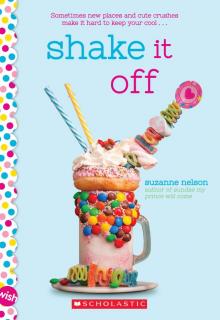- Home
- Suzanne Nelson
Sundae My Prince Will Come Page 6
Sundae My Prince Will Come Read online
Page 6
Ethan shrugged. “No reason. Only … he’s so lax with everything. And you were pretty much with him all day.”
“I didn’t have a choice. He had to introduce me to his mom, and he’s working at the parlor now.”
Ethan frowned. “You know half the girls at school have a thing for him.”
“What?” There was something about his tone that gave me pause. Wait a sec … was he jealous?
He shrugged, giving me a small, sheepish smile. “Just saying.”
“Lucky for you, Italian accents aren’t my thing.” I said it teasingly, but when he didn’t laugh, I stopped to face him, squeezing his hand in mine. “Hey. You’re my boyfriend, remember? And I make my own decisions. You know that.”
Ethan nodded as we climbed the stairs to the apartment. “It’s just not like you to keep stuff from your mom. I mean, since the divorce you’ve been … protective of her.”
My heart squeezed in my chest. He knew me so well. “But that’s part of why I’m waiting to tell her. She was in such a bad mood at the parlor today, and you know how she’s been about dance.” I dug my key from my pocket. “I want to find the right time, and a way to say it so that there’s no chance we’ll end up fighting about it.”
Ethan smiled at me. “You’re right. You can handle your mom. And … well, it’s great of Lanz to have set this whole dance thing up for you.”
I put my arms around him, giving him a hug. “Thanks,” I said into his shoulder.
He kissed me lightly, sweetly, but as he did, my mind whirred with a new, startling question. Was this lukewarm coziness how a kiss was supposed to feel? In a flash, I thought of how my pulse spiked whenever I was around Lanz. I pushed the thought away as a shiver of guilt ran through me.
“Chilly?” Ethan asked.
“I … must be.” I stepped inside. “See you tomorrow at school.”
I shut the door, leaning against it and trying to clear my head. Yup. Chilly … in eighty-degree weather. That had to be the problem.
When Mom walked through the door half an hour later, I held up the tray of sandwiches I’d just finished making.
“Dinner,” I announced.
“Lifesaver.” Mom kissed me on the cheek and sank onto the couch. “What a day.”
I set the tray on the coffee table and handed Mom her sandwich—toasted bread layered with apricot cream cheese, pineapple, egg, and ham. It was one of our long-time favorites, a Hawaiian specialty, and easy enough for me to make without Mom’s help.
The sandwich was usually an automatic mood-booster for Mom, but not tonight. As I finished my sandwich, Mom was still nibbling at hers, wearing a distant, preoccupied expression.
“Mom?” I nudged her. “Want to watch some Gilmore Girls?” She loved that show, but she only shook her head.
“Malie, we need to talk,” she said, her voice drained. “Mr. Sneeves doesn’t think I’m doing a good job managing the shop. Our menu needs updating. We need to draw in more customers, make our flavors more exotic. If I can’t do that …” Her voice faltered.
“What?” I scooted closer to Mom. I hadn’t seen her this upset since I was younger, back when she and Dad fought all the time.
“If I can’t do that, he’s going to look for a new parlor manager,” she whispered.
Fury blazed a trail from my head to my toes. “He can’t do that!”
“He can do whatever he wants.”
“He’s such a jerk.” I stood up and stomped to the sink with my plate, resisting the urge to slam it onto the counter. “You’ve been telling him for weeks that the soft-serve machine wasn’t acting right. What happened today was because he ignored you. He’s—”
“My supervisor.” Mom walked up behind me, frowning. “It’s only because of him that I have this job.”
Her voice was stern and disappointed all at once. I hated the idea of Mom answering to a boss as stony and exacting as Mr. Sneeves.
She bit her lip. “Malie, it won’t just mean losing a job. I’m not sure we could afford to stay in Marina Springs—”
“Stop,” I interrupted, feeling the urge to clamp my hands over my ears like a child. “That won’t happen. We’re not going to let it happen.” A hard resolve stole over me. “There’s no way Mr. Sneeves is going to fire you. We’ll figure it out. We’ll come up with some new flavors, and—” An idea blossomed in my head. “We’ll start using all fresh ingredients. Like Lanz suggested.”
She gave me a tired smile. “We’ll see what happens. This isn’t your problem to worry about. Only …” She sighed. “You were so upset over losing dance, I thought maybe if you understood more of what was going on, it might make it easier for you.”
Guilt trampled my heart. “It’s okay, Mom. I’m not giving up on the idea of dancing,” I added cautiously. “I know I’ll have more chances.”
Mom put her nearly untouched sandwich in the fridge. “Your dad used to talk like that about his art. No matter how many galleries turned down his paintings, he was convinced he could still paint as a career. It would’ve been easier for him—for … us—if he’d just accepted it and moved on.”
“Dad could never not paint. He’d be miserable.” Dad had always been the dreamer, while Mom was the practical one. Maybe that was why Dad understood my love of dance so well. Since Dad moved back to Oahu, he spent most days on the beach painting landscapes and then selling them at a sidewalk stall to tourists. He loved what he did, but making a living doing it was another matter entirely. That had been one of the many things he and Mom had fought about before the divorce.
“Well. He made choices.” Regret filled her voice. “And … that’s that.” She rubbed her temples, as if this conversation was giving her a headache. “I’m going to bed.” She gave me a quick hug. “Thanks for making dinner.”
I nodded, washed the dishes, and headed into my bedroom. My brain was too tangled with thoughts for sleep, so I sat in front of my laptop and FaceTimed with Dad. Seeing his smiling face always made me feel better. And since Hawaii was six hours behind us, it was still early there.
Dad answered right away, beaming. We spent a few minutes chatting easily about school and his painting. Then his expression changed.
“Kiddo,” he said soberly, “your mom told me about what happened with the tuition at the conservatory.” His face was pinched on the screen. “I’m sorry. I wish I could help out. I would if there was any way—”
“I know, Dad,” I said quickly, wanting to get off the topic. The less I said about dance, the better.
Dad grinned. “Hey, tomorrow I could sell ten paintings and then …” He raised his hand in the shaka sign. “Golden.”
“Golden.” My voice emitted a confidence I didn’t feel. As Mom once said, Dad was the master of hanging hopes on rainbows.
“Everything else copacetic?” he asked.
I hesitated, thinking about Mom’s job. It was on the tip of my tongue to tell him, but … no. Mom wouldn’t want me to get into all that with Dad.
“Yup.” My voice rose cheerily. “Copacetic!”
“Great. Oof, it’s getting late, kiddo. Got to set up my booth. Love you.”
“You too, Dad.” I blew him a kiss and then the screen went dark.
As I got ready for bed, I wondered: Would Mom ever understand my dancing, when she couldn’t understand Dad’s art?
“Your allongé! No no no. Not like that.” Signora Benucci clucked her tongue.
A line of sweat trickled down my temple. My leotard was soaked. But I didn’t dare move a single muscle, or the arabesque I was holding would break. Signora Benucci stood in front of me, her expression strict but still kind. In the first two days of training with Signora Benucci, I’d learned that she was demanding, pushing me to the limits of my strength and endurance. She’d have me repeat a piqué or a glissade jeté over and over again until she was satisfied with my form.
“You must extend your arm, and reach,” she said now. “Imagine something at your fingertips. Something you must ha
ve. Chocolate, diamonds, your heart’s desire—”
I closed my eyes, holding the position, and I reached, seeing in my mind’s eye what I longed for. Cinderella. Every muscle in my body elongated, my rib cage opened, my lungs expanded, my chin lifted …
“Yes! Yes!” Signora Benucci smiled. “Brillante! Now, move into your pirouettes. Travel. And again, again, again …”
I led with my chin, fixing my eyes on the corner of the studio, turning and turning, channeling flumes of energy. When I reached the wall, I stopped, breathless.
“An improvement indeed.” Signora Benucci nodded her approval as she handed me a towel. “But there is still much work to do.”
I caught my breath as I wiped the dampness from my neck and face. “Just tell me what I need to do, and I’ll do it.”
She paused, studying my face. “I believe you will.”
I checked the wall clock. “I have to get going.”
“Before you leave, I have something for you.” She disappeared into the storage closet at the back of the studio, and a moment later, returned holding a pair of pale pink pointe shoes. “Here you are.” Signora Benucci smiled as she handed them to me.
My heart leapt as I took the shoes, cradling them in my arms. I giggled in spite of myself.
“What is it?” she asked.
“Nothing. Only … well, for a second I thought you might throw them at me. Lanz told me—”
“That I throw shoes when I’m unhappy with my dancers?” Signora Benucci rolled her eyes. “That boy. Always the joker.” She winked at me. “Although I have been known to throw a pair or two at him, when he sleeps through his alarm.” She nodded toward the shoes. “I believe they’re your size. Try them to see how they feel.”
I took off my old ballet slippers and slid my feet into the pointe shoes. Then I slowly rose up entirely onto my toes. Suddenly, I felt taller, more graceful, as if the pointe shoes were transforming me. “They feel strange … but amazing.”
“There will be pain,” she warned. “Expect blisters and calluses. Only, for you, I think it will hardly matter. I do believe you’d dance on hot coals if that was your only option.” She wagged a finger at me. “Make sure you use your arch stretcher and keep up with your exercises. Break in the toe box tonight. That will help.”
My stomach knotted even through my joy. “But … they look brand-new. Did you …”
I’d had to tell Signora Benucci only yesterday that I wasn’t sure when I would be able to buy pointe shoes. I couldn’t ask Mom for the money to buy them, and even if I could, I wasn’t sure we’d be able to afford them anyway. And now here was Signora Benucci, giving me a pair of pointe shoes that were exactly my size?
“What nonsense!” Signora Benucci clucked her tongue. “I found them in our supply closet, barely used. Someone must have left them here some time ago.” It wasn’t coincidence, I knew; it was a kindness. Only I didn’t know how or when I’d be able to repay her. “Now go … prontissimo!” She clapped and turned away, signaling the end of the discussion.
I practically ran all the way to Once upon a Scoop, smiling every time I thought about my beautiful shoes. I burst through the back door of the kitchen, dying to show them off. Then I froze, remembering. I couldn’t show them off. At least, not to Mom. I’d have to keep them from her. My stomach fell. Another secret.
“Malie, is that you?” Mom called from out front. A second later, she stuck her head around the door. “I can’t find the latest inventory list. Mr. Sneeves said he dropped it off earlier today. Take a quick look in the back office and bring it out if you find it?”
“Sure.”
In the back office, I found stacks of papers and receipts, but no inventory list. I opened the bottom drawer of the desk and scanned the files, and when I opened the last one, my heart stopped. There was a stack of job applications, each with dates from the last few days, each with the job listing for “Store Manager” written across the top.
This could only mean one thing: Mr. Sneeves was interviewing people to replace Mom. Anger brought heat to my face. How could he do this to her? She hadn’t even had a chance to make any changes to the parlor yet. I gripped the file, pulling it from the drawer.
“No inventory list back here!” I called to Mom. Then I hurried into the kitchen and shoved the file into my schoolbag. Maybe Mr. Sneeves would think he misplaced it. I didn’t know if it would stall the process, but hopefully, it would buy us some time.
“Buongiorno!”
I jumped, startled, and fell back against Lanz. He caught me, laughing. His arms around my waist sucked the air right out of my lungs. No no no no, I scolded myself. This could not keep happening.
“Lanz.” I stepped away. “You startled me.” I made myself sound way more irritated than I actually felt. If the best offense was a good defense, then my defenses were going up. Way, way up.
His smiled wavered with his surprise. “But … what is wrong?”
“Nothing,” I grumbled. “I’m fine.”
He laid his hand on my arm. “No,” he said quietly. “I don’t believe you are.”
I tried a glare and failed miserably. I wanted to be angry with him, to push him away. But it was impossible. His expression was too open, too cute, too … everything. “I just … ,” I started, feeling a storm of frustration building. “I’m just sick of this place! Of working here!” I threw up my hands. “I hate the ice cream, the customers. All of it!”
He raised one adorably crooked eyebrow. “You hate ice cream?” The corners of his lips slowly curled upward. “I do not think so.”
“Fine.” I blew out an exasperated breath. “I don’t hate it. But … I hate what it does to my mom. How she spends every waking minute here and then loses sleep over it at night.”
Lanz sat down on one of the metal stools by the ice cream maker and motioned for me to do the same. “Tell me.”
I hesitated, feeling like I was standing on the precipice of something big. But Lanz kept looking at me, waiting, his dark, sincere eyes never leaving mine. Ethan, I pleaded as I teetered at the edge. Why couldn’t Ethan be here right now? Safe, constant Ethan. But Ethan, I knew, was staying late at school to work on his invention.
I took a deep breath, and started talking. Maybe a few minutes passed, or an hour. I didn’t know. At some point, a steady rain started falling. I could hear it tap-dancing on the roof over our heads, and I was thankful. Rain like this meant fewer customers. I heard the bell out front jingle half a dozen times, but that was no big deal. Mom stayed up front to handle the orders, which meant I could tell Lanz everything without her overhearing.
I told him what was going on with the parlor, and what Mr. Sneeves had said to Mom about needing to bring in more business. I told him about the job applications I’d found. And I told him how much I worried about Mom and her happiness, how she tried so hard not to let on that she was struggling.
“I want to help her,” I said, “but I’m not sure how.”
Lanz stayed silent for a long minute, and then smiled. “Gelato.”
I blinked. “Huh?”
“We will add gelato to the menu!” Lanz was already moving around the kitchen, grabbing eggs and milk from the refrigerator, and sifting through the fresh fruits and spices that sat on the counter. I hadn’t noticed until just then how, over the last few days, the parlor’s kitchen had been filling with Lanz’s fresh ingredients. Now that I thought about it, I realized that each day he’d brought in some lemons from the farmers’ market, or a coconut from one of the trees outside his apartment building. Slowly but surely, he’d been transforming our kitchen. “We’ll start with vanilla,” he said with decisiveness.
“But we already have vanilla ice cream. Isn’t vanilla gelato kind of … basic?”
Lanz stared at me, his mouth agape. Then he let loose a string of Italian that, even though I couldn’t understand a word, sounded a lot like ranting. “Basic!” He practically spat the word. “Do you call a grand jeté basic? Or a tombé?”
<
br /> “No way,” I scoffed.
“Because it is art!” He deftly measured milk and cream into a saucepan. “There is nothing basic about gelato. Five hundred years, gelato has existed! It was invented for the court of the great Medicis. My great-great-great-grandfather passed this recipe down to his son, and then to his son after him, and so on and so on …” His eyes gleamed with pride. “Until my father passed it on to me. It is a tradition.”
He looked so uncharacteristically serious, I suddenly felt the urge to laugh. And then … I was laughing. “I’m sorry,” I hiccuped. “It’s just … for a second, I thought you were going to tell me that if I ever shared your secret recipe with anyone, you’d have to kidnap me … or something.”
He only smiled at that, making my cheeks burn hotter. Then he handed me what looked like a charcoal-colored snap pea. “Smell.”
I hesitantly lifted the bean to my nose and breathed in. The silky-smooth scent of vanilla flooded over me. “Yum.”
He nodded toward the saucepan. “Into the pot.”
I dropped it in, and within minutes, the liquid began to simmer. Lanz scooped out the vanilla bean and opened the pod, scraping the seeds back into the pan, then throwing away the pod shell. We added eggs, just like we had when we’d made ice cream before, only Lanz put in fewer eggs and less cream.
“Less fat means more flavor,” Lanz explained. “And we churn it more slowly than ice cream, too, so less air gets into the mixture. But before we do that, we strain the custard.” He poured the custard slowly through the strainer in the sink. “This makes the texture smooth and creamy.”
When the custard was ready, we set it in the refrigerator. While we waited for it to chill, we worked on Lanz’s English reading. The rain kept falling, and the shop stayed quiet. Before I knew it, Mom was closing up for the night.

 Pumpkin Spice Up Your Life
Pumpkin Spice Up Your Life Shake It Off
Shake It Off Hot Cocoa Hearts
Hot Cocoa Hearts Sundae My Prince Will Come
Sundae My Prince Will Come Cake Pop Crush
Cake Pop Crush Donut Go Breaking My Heart
Donut Go Breaking My Heart Serendipity's Footsteps
Serendipity's Footsteps Macarons at Midnight
Macarons at Midnight You're Bacon Me Crazy
You're Bacon Me Crazy